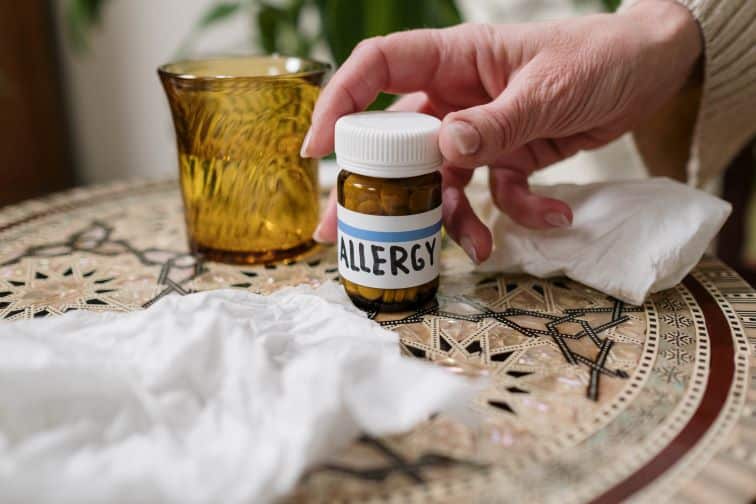It’s that time of year again! The runny nose, itchy eyes, and congestion are here. But while we have all been brought up to believe that pollen, grass, and weeds (environmental allergens) are the cause of these symptoms, what if there was something else underneath the radar that was truly the cause?!
In actuality, the reason your responses to these environmental allergens is heightened is because your immune system is on high alert due to chronic inflammation. You’re overactive, over-stimulated immune system becomes hypersensitive to seasonal allergens, and results in the symptoms you feel.
The Seasonal Allergy and Gut Health Connection
Your gut plays a huge role in your immune system health. In fact, 70-80% of your immune system is located in your gut. It’s the place in your body that interacts with the outside world more than any other. It takes in nutrients from food, keeps out bacteria, pathogens, heavy metals, herbicides/pesticides, other chemicals, and undigested food. That’s why the key to reducing seasonal allergies is to calm the inflammation in your gut in order to restore your immune system’s balance.
Intestinal Permeability aka Leaky Gut Syndrome
Your small intestine, located between your stomach and large intestine, is embedded with millions of tiny blood vessels that pick up the nutrients from your food and transport them around to the cells of your body for fuel. Within your small intestine are also a single cell layer of enterocytes that are tightly packed together by “tight junctions.” It is a single cell layer thick because if there were too many cell layers it would be difficult for nutrients to move into the bloodstream. On the surface of the enterocytes are finger-like projections knows as villi. Villi increase the surface area so you can absorb more nutrients. On the surface of your villi is a thin coating known as Secretory IgA (sIgA), which is your immune system. When you eat food, the immune system in your small intestine has to determine if it looks like a friend or a foe. Some foods look like a foreign invader to your immune system and when the immune system gets activated there is a little bit of inflammation that results.
Inflammation in and of itself is not a bad thing, but chronic states of inflammation can begin to wear down the immune system, damage the villi, and open up the tight junctions. In addition to foods, other foreign invaders can elicit an inflammatory response, such as parasites, viruses, bacteria, molds/yeasts, chemicals, heavy metals, pharmaceuticals and antibiotics. Over time, as chronic inflammation continues, the delicate gut barrier can be breached and the immune system becomes hypersensitive throughout the body. Your over-active immune system begins to react to pollens, dust, weeds, grasses, and environmental mold and the result is the myriad of symptoms that you feel in the spring and fall.
I Have Symptoms Right Now! What Can I Do?
It is important to have an understanding of histamine in order to help you. Histamine is much more than the stuff that causes a runny nose, watery eyes, and itchy skin. It is involved in local immune responses, regulates some gut functions, and is a potent brain chemical known as a neurotransmitter. Histamine is found in nature in plants, venoms and stings, certain bacteria and fungi, and in human organ tissues, such as the skin, lungs, and gastrointestinal tract.
Common Symptoms of Histamine Overload
• Headaches/migraines
• Difficulty falling asleep
• Hypertension
• Vertigo or dizziness
• Arrhythmia, or accelerated heart rate
• Difficulty regulating body temperature
• Anxiety
• Nausea, vomiting
Allergy Medicine: Anti-histamines
Many people resort to taking anti-histamine medications to help with their allergy symptoms. It is important to note that there are two kinds of histamine receptors on the cells of your body; H1 and H2 receptors. H1 receptors are involved with GI smooth muscle contraction, bronchial smooth muscle contraction, and dilation of arteries and veins. H2 receptors are involved with heart stimulation, dilation of arteries and veins, and stomach secretion. Some drugs interact selectively to these receptors.
Specific Drugs
H1 Blockers
H1 blockers work as decongestants and on itchy skin, eyes, and throat. Examples of H1 blockers would be Benadryl (which is highly sedating, over-the-counter, and works to reduce local histamine reaction, but also reduces GI muscle contraction which can mean constipation), Claritin and Zyrtec (which are less sedating, over-the-counter, and metabolized by the liver), and Allegra and Clarinex (which are not metabolized by the liver).
H2 Blockers
H2 blockers decrease stomach acid and pepsin secretion and are often taking for acid reflux, GERD, and ulcers. Examples include Tagamet, Zantac, Pepcid. They impact allergies because they inhibit the action of histamine on the cells of the stomach.
Supplements That Work On Histamine
- Histo-X™ by Apex is an advanced formula that incorporates numerous natural compounds to support immune function and the body’s response to foods and other environmental factors.* Offering key phytochemicals, such as petasin and isopetasin, this formula may also aid in gastrointestinal function and antioxidant processes.* Additionally, it may help support peripheral blood flow to the major organs.* Ingredients include extracts of butterbur, mangosteen, ginger, quercetin, and stinging nettle.
- HistaminX by Seeking Health provides a combination of supportive herbal and plant-derived compounds that may work together to support seasonal comfort and a healthy inflammatory response. Contains bioflavonoids quercetin, rutin, and luteolin may play a role in modulating the body’s histamine response.*
- Allerplex: Supports the body’s ability to handle seasonal, environmental, and dietary challenges. Supports the body’s natural ability to manage mucus movement. Supports healthy liver function. Supports healthy lung and respiratory function
What Else Can I Do?
- Adopt a low histamine diet (decrease foods that are histamine rich or histamine releasing) during peak allergies
- Supplement with Histamine Block by Seeking Health, which contains diamine oxidase (DAO, the main enzyme responsible for the degradation of ingested histamine)
- Fix Gut Issues:
- Anti-inflammatory diet
- Nutritional compounds/supplements that provide key nutrients for cell healing
- Remove toxins and infections
- Take digestive enzymes (such as Enzymix Pro by Apex)
- Balance gut microbiome with appropriate probiotics
- Reduce Exposure to Household Chemicals
- Balance Your Immune System with Nutritional Compounds for General Health and Gut Barrier Support
- Vitamin D: Help maintain intestinal barrier through T-reg cell support
- Vitamin A: Help maintain intestinal barrier
- Turmeric: Anti-inflammatory
- Glutathione: Anti-oxidant, liver biotransformation
- Short Chain Fatty Acids: Feed T-reg cells



